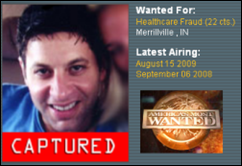Giving a patient medications in the ER, having them pop positive on a test, and then withholding further medications because…
News 12/18/09
From Lucius Q.C. Lamar: “Re: Cerner. I hear they are working with Cisco to develop a payer product.” Unverified, although the companies have worked together on Cisco’s health center and Cerner’s pilot of Cisco’s TelePresence, so maybe they are BFFs.
From Broadway Joe: “Re: Best holiday wishes to Mr. H and Inga! I really enjoy your blog and appreciate all the hard work you both do to provide us with timely and witting industry information.” Thanks and back atcha. We wouldn’t do it if it wasn’t fun for us, too.
From Hellboy: “Re: EMR articles. Why do you deny conclusions that EMRs don’t provide the expected benefits?” Because I also deny conclusions that they do. Healthcare people are already lemming-like enough without obsessing over whether a 1982 Invision implementation disappointment should mean anything to them. On the other hand, fretting doubters are probably justified in holding back since that kind of hand-wringing usually predisposes to project failure. All these articles carry the subtle message that the semi-study of a few wildly different implementations will yield a universal predictor of software-correlated outcomes. I don’t buy that for a minute. As I’ve said ad nauseam, if software was a magic bullet, every hospital spending their $50 million on Epic or Cerner would simply drive all their competitors out of business with lower costs and better outcomes. They aren’t. Your mileage will most assuredly vary no matter how many articles you read.
From Skip Tracer: “Re: GE. As the owner of a EMR reseller and a competitor to GE, it’s offensive that they received government bailout money and then have turned around and offered free financing to their prospective clients. Now, I know, we’re all feeding at the Obama trough, so I wouldn’t be as ticked if GE used the money to improve their product or services. Instead, they’re floating free money to overcome the fact their product is having problems and their successful installs are few and far between. And, in a roundabout way, I’m helping them do it. Only in America.” GE got $140 billion of taxpayer money to save the GE Capital garbage heap, but only after elbowing its way to the front of the federal bailout bread line by convincing panicking bureaucrats to broaden the definition to “affiliates” of an FDIC-insured institution.
In New Zealand, Waikato District Health Board is recovering from a Conficker computer worm attack that disrupted services to the point that non-emergent patients were asked to stay away. I read somewhere that over seven million PCs are infected with it, meaning those computers will accept remote commands from hackers.
Also in New Zealand, the former health district CIO who was accused of taking $755K worth of kickbacks from a service provider pleads guilty. He had struck a deal to approve a help desk services contract for $95 per hour, of which he received $25. When they board found out, they simply hired the same three people who were already working the help desk, saving $500K per year.
This is juicy: federal prosecutors say former McKesson chair Charlie McCall should be jailed immediately because he violated terms of his 2003 release with his 2006 arrest for soliciting a prostitute. I have a couple of boffo lines, but I like to keep it family-friendly (but I bet you are thinking the exact same ones). He’s been out on $1 million bail since 2003 with a condition that he not commit any crimes. He’s already been found guilty of the $8.6 billion HBOC stock fraud and will be sentenced in March. The US attorney says Charlie needs locked up since he might skip town before then.
RIM just announced Q3 numbers: smoking BlackBerry sales pumped up revenue by 41% and moved earnings to $1.10 vs. $0.69, with most of the good numbers coming from consumers rather than business customers.
University of Alberta professors design software that helps senior citizens identify and organize their tablets and capsules (which are not the same as “pills” no matter what the article says), hoping to port it to a smartphones.
I usually read Bruce Friedman’s Lab Soft News, which has interesting conjecture about the Abbott acquisition of Starlims:
Putting all this all together, I think that it’s possible that Abbot has the following scenario in mind as a long-term goal: sell to clinical labs, as an integrated package, analytic instruments, reagents, and test result management supported by a cloud-based LIS/LIMS. Pricing would be on a per-click or taxi-meter basis. This would be the first PaaS offering for the clinical lab industry
David Whiles, IT director at Midland Memorial Hospital (TX), is recognized by the hospital district’s board of directors for its implementation of OpenVista. He expresses surprise: “It’s a hospital project, not an IT project.” Seems like they should give him a CIO title.
Dell says its acquisition of Perot Systems will allow it to expand its healthcare services, which one might hope given that it just paid $3.9 billion for the company.
Quantros announces creation of a healthcare IT consulting division to be led by Michael Tulloch.
Cerner will offer HealthDock from Certify Data Systems, which it says will help hospitals using its Cerner Hub connectivity services exchange data with any practice EMR system.
MDI Healthcare Solutions gets a mention in the Jacksonville, FL business paper. The company uses claims data to predict the future cost of caring for a given individual. The article’s timing isn’t so great since the company’s Web site is “undergoing renovations” at the moment, consisting of just a picture of what it might look like if it actually worked.
Former Senate Majority Leader Tom Daschle, whose tax woes killed his nomination as HHS secretary, is profiting from HITECH, according to a Huffington Post article. It says he set up a law firm division to cash in on stimulus money, implying that he’s had face-to-face meetings with David Blumenthal “in trying to position our clients for meaningful use.” He’s also on the advisory board of GE Healthcare’s “healthyimagination” project, joining Bill Frist, Newt Gingrich, and “former chiefs of Medicare and the Food and Drug Administration”, although the company implies it’s not paying them much (by their standards, anyway). From the law firm’s Web site: “Our life sciences team members include former U.S. Senate majority leaders Senator Bob Dole and Senator Tom Daschle, a former CMS administrator, a former associate FDA commissioner and a former associate chief counsel for Enforcement at FDA.”
Another hospital thanks their fairy godmother Congressman for EMR money instead of the taxpayers who have to pay it: Rome Memorial Hospital (NY), which will get $250K in Congressional pork funds (aka the $410 billion “Omnibus appropriations act”).
I could write a novel from this: an Indiana otolaryngologist whose sinus clinic was raking in $3 million a year, some of it apparently via insurance company fraud, disappears from vacation in Greece owing $5.7 million. Italian authorities arrest him in the tent he’s living in on a glacier at the foot of Mont Blanc, suspecting he’s fleeing to Switzerland after stops in Monaco, China, and France (and making America’s Most Wanted in the process). He smuggles a box cutter into jail in his rectum and slashes his throat in a suicide attempt, but ends up with only minor neck injuries despite his expertise as a throat surgeon.
HERtalk by Inga
From Easy Money: “Re: Lourdes whistle-blower. The whistle-blower that alerted federal officials of the potential fraud activity at Our Lady of Lourdes Medical Center earned a nice $356,000 bonus. He was supposedly a ‘consultant’. Do you think the hospital paid him a consulting fee?” Easy Money is referring to the $8 million settlement between Lourdes and the Justice Department. The hospital was charged with fraudulently inflating charges to Medicare patients. I did a quick Google search of Anthony Kite and determined he must moonlight as a whistleblower, having been awarded several hundred thousand dollars in similar lawsuits over the last few years.
Here’s some good and bad news for HIEs. The good news is most physicians believe that HIEs would improve quality of care, reduce costs, and save time. However, don’t count on the doctors to help keep the lights on. This survey of 1,000 physicians didn’t find a single doctor willing to pay a proposed $150 a month fee to connect to an HIE. In fact, half of the doctors said access should be free.
Someone might want to share the news with Thomson Reuters, who just announced plans to launch a new HIE platform.
The CIO of the 300-physician Springfield Clinic (IL) claims their Allscripts EMR plus a patient kiosk system netted a $4.5 million ROI in the first year, thanks to staff reductions and reduced transcription costs.
Stratus Technologies announces its Zero Downtime $50K Guarantee. The company says the server line has surpassed 99.999% uptime reliability since introduced in 2001.
Congrats to Cumberland Consulting Group for its #10 ranking in Consulting Magazine’s Best Small Firms to Work For, 2009.
Special alert for all you road warriors: McDonald’s, in partnership with AT&T, will provide free Wi-Fi in over 11,000 restaurants by January. Personally, I’ll remain partial to Panera when it comes to eating and surfing. But, there are definitely more McDonald’s and they have the best fries.
QuadraMed announces GA of Quantim Workflow.
WellStar Health System (GA) selects Kronos to provide workforce management solutions to manage its 11,000 employees in five hospitals.
Every time I see the name Kronos, by the way, I think about Zeus’s father, who ate his children. The Greeks also had a Kronos, the father of time. I am pretty sure that the latter Kronos is the company’s namesake.
Baylor Health Care System (TX) signs a multi-year agreement to license TeleTracking patient flow solutions across 14 hospitals.
Picis says that 67 healthcare facilities have gone live on its LYNX E/Point solution over the last six months.
Healthland wins back a hospital client that left its fold several years ago. The 15-bed Webster County Memorial Hospital (WV) re-signs with Healthland for its patient accounting system, which they claim is its first step towards moving to an EMR system.
Vangent wins a $20 million contract with the DoD to implement a an integrated SSO and context management solution throughout the Military Health System.
Cincinnati Children’s Hospital Medical Center completes a self-service check-in pilot program and now plans to deploy D2’s My Patient Passport Express kiosk throughout its facilities.
Southcoast Health System (MA) selects Wolters Kluwer’s ProVation Orders Sets for its three hospitals.
St. Joseph Health System chooses Accenx to help integrate its hospitals with affiliated physicians.
A faculty physician at UC San Francisco falls for an e-mail phishing scam and ends up exposing personal information on about 600 patients. The doctor gave out his user name and password when replying to what he thought was an internal e-mail.
And in Detroit, health department officials say that clinical and demographic information on 10,000 patients has been compromised following two separate thefts. A flash drive containing patient data was stolen from an employee’s car in October and a desktop computer was taken from a health department facility over Thanksgiving.
Cape Cod Healthcare (MA) signs a seven-year agreement with Siemens to implement Soarian, including Clinicals and Financials. The hospital expects the project to be completed by mid-2011.
Former Ottawa Hospital chair Ray Hession takes over as chairman at the troubled eHealth Ontario.
I’m betting this Congressman gets re-elected. Madison Memorial Hospital (ID), having collaborated with Congressman Mike Simpson for three years, learns it is “likely” to receive a $350,000 EMR grant from the federal government.













About Daschle et al: “Our life sciences team members include former U.S. Senate majority leaders Senator Bob Dole and Senator Tom Daschle, a former CMS administrator, a former associate FDA commissioner and a former associate chief counsel for Enforcement at FDA.”
They sure know about science…the science of minting money. Who dey??
RIM celebrated its earnings by depriving millions of their emails this Thursday morning.
>>> GE got $140 billion of taxpayer money to save the GE Capital garbage heap, but only after elbowing its way to the front of the federal bailout bread line by convincing panicking bureaucrats to broaden the definition to “affiliates” of an FDIC-insured institution.
By “convincing” you of course mean the >$1.2 million lobbying donations to the Democrats from GE over the past 10 years. Can you imagine the return on investment: $1.2 million out, $140 billion bailout in? That’s what I call a good return on investment…
url: http://www.campaignmoney.com/general_electric.asp
Thanks, Noah. I wondered what happened to my emails yesterday.
Just to clarify, I’m pretty sure the $1.4 million to Republicans that GE donated helped too.
Is it not true thay Daschle gets paid just a wee bit by GE? Gee, I wonder how this happened.
I will be away for the holidays. Happy to all of the readers and Mr. H and Inga. Love your blog.
National problem with RIM and all networks but not all bbs. Were there any patient data lost or care delayed?
RE: Former Senate Majority Leader Tom Daschle
Sometimes me thinks the problem in healthcare IT is too much money allocated to the market space. With all that money, especially from Washington, comes politicians, big corporations, and the golden hammer of chasing profits overiding most all other efforts. Call me a cynic!
Would we be better off with much less profit in the healthcare IT space to drive out the latest parade of characters taking up the banner for technology in healthcare? Would that be a good thing?
Re: Cerner developing a payor product. Epic has a strong payor product (Tapestry) that has sold to several provider run health plans recently. I wonder if Cerner is trying to compete more with Epic on this front?